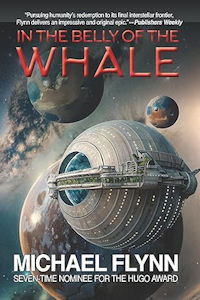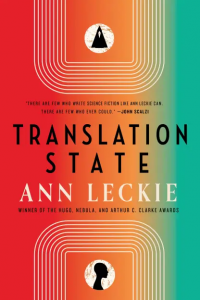Paul Di Filippo Reviews In the Belly of the Whale by Michael Flynn
 In the Belly of the Whale, Michael Flynn (CAEZIK SF & Fantasy 978-1647101015, trade paperback, 400pp, $19.99) July 2024
In the Belly of the Whale, Michael Flynn (CAEZIK SF & Fantasy 978-1647101015, trade paperback, 400pp, $19.99) July 2024
Why is the field of fantastika like Walt Whitman? Because both are “large and contain multitudes.” (And also, parts of it contradict other parts.)
Seriously, though, for at least the past twenty years or thereabouts, the output of fantastika has been so large that no single reader can keep up with everything. It’s not humanly possible. And so today I find myself in the reprehensible position of confessing that I have never read any works by Michael Flynn, despite the fact that he debuted in 1984, and has had a copious, well-regarded career since. But I’ve now remedied that deficit by reading his newest, and I see that I was almost certainly starving myself of some great SF.
In the Belly of the Whale is a generation-ship tale, deploying one of SF’s big “power chords.” But I think it’s safe to say that Flynn’s presentation is pretty unique. The majority of such stories seem to focus on the generation ship citizens as forgetful, lost, degenerated, unaware of their reality. Flynn instead gives us a ship that is two hundred years into its thousand-year voyage, wherein everyone knows quite clearly where they came from, why they are there, and where they are going. The focus thus becomes: what kind of society can sustain such a voyage, what kind of dangers threaten its existence, and how do you stop this nugget of civilization from crumbling. And these themes will be explored through a huge cast of characters having some wild adventures.
The Whale consists of a very large asteroid holding 40,000 people. Portions of it are still being mined for resources. And a sizable section of it, ten percent, the Burnout, was destroyed in a cataclysm. Nowadays that sector—still inhabitable, although dangerous—is home to primitive tribes that subsist through small covert raids on the rest of the ship. At least, the raids have been small and covert till the present day. A small posse of scavengers known as burnsiders makes regular forays there in search of anything useful or rare. The Burnout also holds the secret HQ of another group, the Brotherhood. They are planning nothing less than mutiny.
Because the Whale is gigantic, the usual claustrophobic parameters of most gen-ship novels do not apply. It’s more as if the narrative is being enacted in a sizable village, with neighborhoods, not in corridors where you can reach your arms out and span the width.
The social structure of the Whale has become inequitable and rigidified. As one character remarks, the original sensible command hierarchies have devolved to oligarchies. The families in charge of the essential systems—food, water, air, maintenance, etc.—have become like royalty. The officers—under a go-captain (focused on getting the ship to its destination) and the in-captain (focused on maintaining order inside)—act as if they are superior to the regular citizens. In addition, there’s a standing army, a police force, a squad of Enforcers (they monitor and punish small acts of antisocial behavior), and Ship Security. In other words, a lot of factions and individuals, some noble, some craven, some altruistic, some greedy, some content and some angry.
Flynn intends to show us every level of the Whale’s society from top to bottom, and to do so, he has created a cast of dozens and dozens. Initially, because relatively short chapters come and go at lightning speed, with a shift in POV every time, I had a little trouble sorting them out in my head (an up-front roster of names helps), but within a few cycles, they emerged from my brain fog as very distinct individuals, each with their own speech patterns and sensibilities. If you loved similar big-screen, Cinemascope productions such as Ian McDonald’s River of Gods or Kim Stanley Robinson’s Aurora (certainly a resonant comparison, since it’s also about a gen-ship headed for Tau Ceti!), then you will revel in the multitude here. Flynn charts unforgettable and unforeseeable paths of ambition and treachery, duty and sacrifice, as well as a handful of truly touching love affairs. (Be forewarned: he’s not above killing off folks you regard as major players.)
With such a huge cast, it’s hard to single out any figures who might be deemed the central protagonists. But in any such tale, the author does usually tend to privilege a few favorites.
My contention is that the story of Bùxiè deSōuxún, Detective Chief Inspector, forms the spine of the story. We watch as he moves from solving small crimes to helping, during the times of trouble, Ship’s Security (under the rule of one Peng, who has powers the Shadow would envy). Bùxiè also experiences personal tragedy before ultimately having his heart resurrected by one Winsome (Winnie) Alabaster, Eugenicist 2nd class. Second up might be Dhikpāruṣya Spandhana, or “Big Dhik,” Enforcer of Filial Devotion. A street-smart lummox, he proves a pillar of rectitude, ultimately outwitting and outliving many folks considered sharper than he. Among the upper class, the threads involving Ling-ling, a Princess of Air, and Megwan, a Prince of Water, destined to mate, are very revelatory. Finally, let us not neglect Lt. Lucky Lutz, an unassuming but deadly Marine.
As you might have guessed from some Asian names, the original crew of the Whale was made up of various ethnic strains: “The Departure Generation,” she continued, “was comprised of scores of ethnoi. Polonis and Roos, Chinos and Malayas, Yurpans and Roomies….” Over two centuries the traditions and usages have blended into a hitherto-unseen syncretic form, and Flynn has a great time conveying this novel blend, almost in the manner of C. J. Cherryh limning one of her alien cultures.
Flynn’s prose is top-notch, possessing a Heinleinesque clarity: never cluttered or precious or fusty, muscular and straightforward, but still rich with great neologisms, dialogue and snatches of poetic description. This tool allows him to depict a running battle in the Burnout with as much vividness and vivacity as he uses to show us the politesse among the “bluecapes” and “goldcapes.”
Ultimately, arising out of all the granular quotidian exploits, Flynn is giving us a very old story to which we should always pay attention. I’ll let the wise Peng close out my review.
Peng tossed his head. “Understanding is not forgiving. There are three ways to rule men, lieutenant: by one, by some, or by many. Everyone creates in his own image, and the Planners of the Imperium were no exception. So, they gave us an aristocracy like themselves. But every regime decays into some form of anarchy. Monarchs become lawless tyrants; aristocracies, squabbling, self-interested oligarchies; and republics decay into democracies.”
Lucky shifted in her seat. “Why are you telling me this? Will there be a quiz later?”
Peng smiled without humor. “In a way. You know, it is easy for the Brotherhood to comfort themselves with the idea that the oppressive regime will be swept away and replaced with one of their own devising. But whoever builds the new Whale order will have known only the old order and cannot help replicating it, as the Planners replicated their own aristocracy. Overthrow the Bourbons and get the Terror and, shortly, an Emperor with secret police. Topple the tsars, and you get the commissars.”
 While you are here, please take a moment to support Locus with a one-time or recurring donation. We rely on reader donations to keep the magazine and site going, and would like to keep the site paywall free, but WE NEED YOUR FINANCIAL SUPPORT to continue quality coverage of the science fiction and fantasy field.
While you are here, please take a moment to support Locus with a one-time or recurring donation. We rely on reader donations to keep the magazine and site going, and would like to keep the site paywall free, but WE NEED YOUR FINANCIAL SUPPORT to continue quality coverage of the science fiction and fantasy field.
©Locus Magazine. Copyrighted material may not be republished without permission of LSFF.






